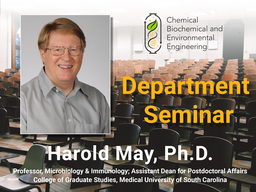Department Seminar Series - Dr. Harold May
Talk Title: Microbiome Research Inspired by Volta
Location
Online
Department Seminar Series - Dr. Harold May – Online Event
Date & Time
March 29, 2021, 12:00 pm – 1:00 pm
Description
Title
Microbiome Research Inspired by Volta
Abstract
Unbeknownst to him at the time, Alessandro Volta was an early developer of microbiome research. Although microbiome was not a term used in the late 18th century, for that matter it was not used during my training during the 20th, the inventor of the battery was examining and testing an anaerobic microbiome when he stirred the mud in a pond to capture and then ignite “flammable gas” as he described his experiment to Father Campi in 1776. Volta has been inspiring much of my research, beginning with methanogenesis, continuing with bioremediation in aquatic sediment, and finally in electromicrobiology. Studies of pure culture microorganisms have been critical for much of my research, but the performance of microbial communities or microbiomes are what I find most fascinating and useful. For that reason, I intend to share with you 1) our development of a microbiome to treat polychlorinated biphenyls in situ, and 2) the development of an Electrobiome® to convert CO2 into chemicals and fuels. Finally, I will complete my presentation with some speculation on what might be done with the microbiomes associated with macroalgae, i.e. kelp.Biography
Dr. May is an environmental microbiologist/microbial physiologist with 40 years of experience in industry, government labs, and academia. Common themes of his research and teaching are anaerobic microbiology, the study of microbial communities, and the development of new biotechnologies. His career path began with an interest in methanogenesis, still a favorite topic for Dr. May, and his PhD research with Dr. Greg Ferry at Virginia Tech (now emeritus at Penn State). Following postdoctoral research on nitrogen fixation with the US Department of Agriculture he became a research Scientist at Celgene Corporation where he led research teams of scientists and engineers on wastewater treatment and bioremediation projects. In 1994 he was able to transfer his research on polychlorinated biphenyl (PCB) biodegradation to the Medical University of South Carolina which was expanding into new programs with the College of Charleston and eventually the Hollings Marine Laboratory where his laboratory presently resides. Since then he has extensively researched the microbial reductive dechlorination of PCBs and other chlorinated compounds, developed a method to treat PCBs in sediment which is now being used commercially to treat PCBs in situ, initiated some of the first thermophilic microbial fuel cells, and developed some of the earliest microbial electrosynthesis systems aimed at converting CO2 into higher value chemicals and fuels. In addition to his research, teaching and numerous committee duties, he is now the Assistant Dean for Postdoctoral Affairs within the College of Graduate Studies where he assists postdocs with their career development, including through a new initiative called Accelerate to Industry for those interested in that as a career path.
The May Lab
Meeting Details
Meeting link: https://umbc.webex.com/umbc/j.php?MTID=mca238356c6bac313f35ae57af6e92ab2Meeting number: 120 743 4157
Password: T3mNCqBQg35
Join by phone +1-202-860-2110 United States Toll (Washington D.C.)
Access code: 120 743 4157
Tags:
